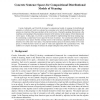Free Online Productivity Tools
i2Speak
i2Symbol
i2OCR
iTex2Img
iWeb2Print
iWeb2Shot
i2Type
iPdf2Split
iPdf2Merge
i2Bopomofo
i2Arabic
i2Style
i2Image
i2PDF
iLatex2Rtf
Sci2ools
CORR
2011
Springer
2011
Springer
Concrete Sentence Spaces for Compositional Distributional Models of Meaning
Coecke, Sadrzadeh, and Clark [3] developed a compositional model of meaning for distributional semantics, in which each word in a sentence has a meaning vector and the distributional meaning of the is a function of the tensor products of the word vectors. Abstractly speaking, this function is the morphism corresponding to the grammatical structure of the sentence in the category of finite dimensional vector spaces. In this paper, we provide a concrete method for implementing this linear meaning map, by constructing a corpus-based vector space for the type of sentence. Our construction method is based on structured vector spaces whereby meaning vectors of all sentences, regardless of their grammatical structure, live in the same vector space. Our proposed sentence space is the tensor product of two noun spaces, in which the basis vectors are pairs of words each augmented with a grammatical role. This enables us to compare meanings of sentences by simply taking the inner product of the...
CORR 2011 | Education | Space | Tensor Product | Vector Space |
| Added | 13 May 2011 |
| Updated | 13 May 2011 |
| Type | Journal |
| Year | 2011 |
| Where | CORR |
| Authors | Edward Grefenstette, Mehrnoosh Sadrzadeh, Stephen Clark, Bob Coecke, Stephen Pulman |
Comments (0)

